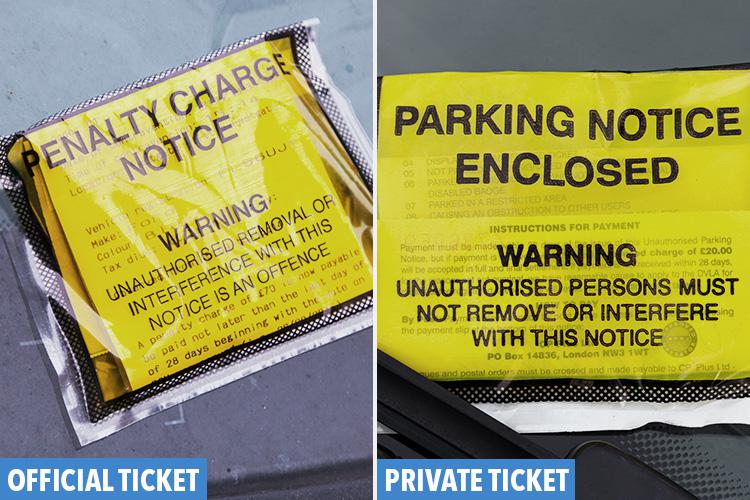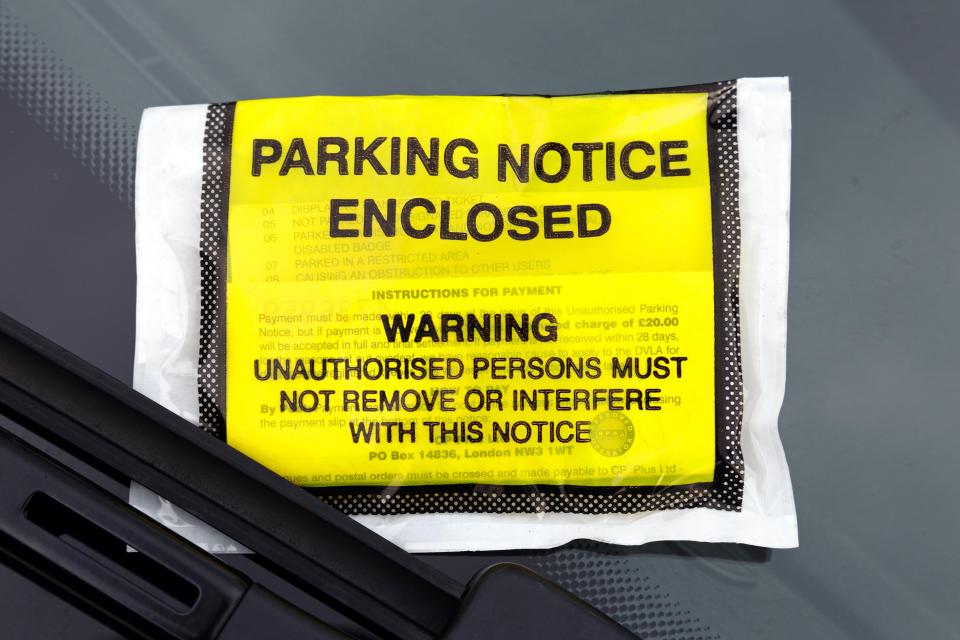One ticket is official and the other ISN’T – how you can avoid paying an unfair parking ticket
The tickets look remarkably similar but one is an official ticket and the other just an invoice

THAT moment of dread when you return to your car to see the yellow parking fine stuck to your windscreen mirror.
But drivers are able to challenge unfair parking tickets and in some cases completely avoid paying those issued by private firms.
Tickets from private firms and official bodies may look very similar - but one of them is much easier to fight than the other.
Private companies try to trick drivers into thinking the penalty notices are the same in a bid to force people to cough up the cash.
What’s the difference between a penalty charge notice and private parking ticket?
The ticket on the left is an official one, issued by the council or the police, it will be called Penalty Charge Notice, Excess Charge Notice or Fixed Penalty Notice.
It will include the name of the issuing authority and will have been issued on public land, such as a high street or council car park.
The ticket on the right is a parking fine from a private company. It is just an invoice and they have no official right to fine you.
RELATED STORIES
All they are doing is sending you a notice for what they deem to be a breach of contract.
It is not an accident that the design and wording are very similar.
Steve Nowottny, from MoneySavingExpert.com, said: "If your car has been slapped with a parking ticket, then the first thing to do is check what kind of ticket it is.
"You should only appeal unfair tickets – if it’s a fair cop and you’ve broken the rules, there’s not point trying to fight it. But if you think you have been penalised unfairly, it’s well worth standing your ground."
How you can challenge an unfair parking ticket?
No matter who has issued the parking ticket it is possible to fight it if you think you've been unfairly charged.
Although, it's important to keep in mind that the fine may increase if your appeal is unsuccessful.
An official ticket from the council or police
If a Penalty Charge Notice was issued by the local council, unless you have grounds to appeal, you should pay up.
Here you have broken the law. The penalty is just that - a genuine penalty or fine - not just a “charge”.
If you do have a compelling, or very persuasive reason for appealing, the council can use its discretion to decide whether to cancel the notice.
REASONS FOR APPEALING AN OFFICIAL TICKET
A ticket may be deemed unfair by the council or an independent adjudicator, if:
- Signs were wrong. If the signs weren't visible or gave the wrong information.
- The traffic warden got it wrong. E.g, if they gave you a ticket when they shouldn't have.
- An error on the letter or ticket. If they've left out any information on the 'Notice to Owner' letter, then you could get it waived.
- You didn't own the vehicle at the time. You'll have to prove this, such as information you provided to the DVLA.
- Your car was stolen. If a thief parked the car illegally then you can get it waived.
First, drivers will have to complain to the council in writing, with any witness statements or photographs included.
If the council accepts your reasons for appealing, your fine will be cancelled and you’ll have nothing to pay.
If the council rejects your reasons, you will be sent a notice of rejection. You will then have 28 days to make a formal appeal or the charge could increase by another 50 per cent.
You can also take the case to an independent adjudicator, for more information .
A parking ticket from a private company
Firstly, find out what company has issued the ticket. There are some big private firms, such as Britannia Parking Group, Euro Car Parks, Indigo Park Solutions, NCP and ParkingEye.
They operate car parks for supermarkets and big retail parks around the UK.
Gather evidence if you plan to appeal, for example, take photographs to show unclear signs or anything else that might be relevant.
Keep all your correspondence with the company and hold off paying the fine if you want to challenge it.
Check to see if the company is a member of a trade body such as the British Parking Association (BPA) or International Parking Community (IPC).
Most of the big, private car park operators are part of this adjudication scheme. Popla (Parking on Private Land Appeals) was set up by the BPA for its members.
If Popla agrees with the driver the charge is cancelled. If the driver’s appeal is refused, the company can carry on seeking payment and ultimately has the option of taking the vehicle owner to the small claims court.
While the Independent Appeals Service was set up for .
If the firm is not part of a trade body then you could send them a letter saying that you refuse to pay. This could be because you didn't break any rules, there was insufficient signage or you weren't on private land.
In theory, the company could take you to court if you refuse to pay. Steve Nowottony, from MoneySavingExpert.com, added: "An average of 56 per cent of those who take their case all the way to an independent adjudicator win – but if you lose you’ll have to pay the full fine."
For more information see .
Additional reporting by Charlotte Burns.
We pay for your stories! Do you have a story for The Sun Online news team? Email us at tips@the-sun.co.uk or call 0207 782 4094













